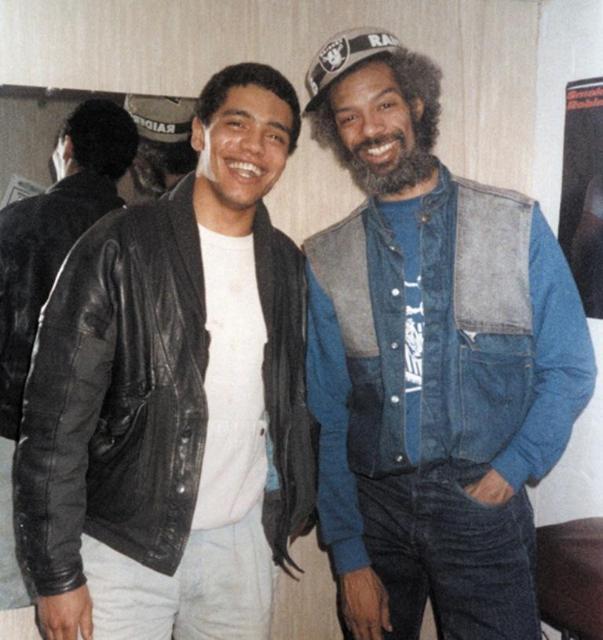When a young Malik showed up at Gil Scott-Heron’s Liverpool gig in 1984, he had no ticket and no idea how he’d get in, yet, against the odds, he managed to sail through security. After nine years in the care system, Malik describes himself as having been rendered “semi-literate, homeless and bereft of hope” by the system. He was searching for inspiration that night, so when he found himself backstage after the transformative gig, he knew he couldn’t leave without giving his hero a compliment.
“Gil was standing there sweating with a towel around his neck,” Malik remembers. “He was surrounded by promoters, reporters, people trying to get paid, everyone wanting something from him, yet he’d just given his all on stage.
“I had nothing of my own but I wanted to give the guy something, so I walked over to him, thanked him, and paid him a compliment, telling him I was really moved by his performance, then I turned to leave. And he said, ‘Hey brother I heard y’all had some riots around here, you wanna tell me about it?’”

Photo copyright Malik Al Nasir
Neither Malik nor Gil could have imagined that this moment was the beginning of a friendship which would last a lifetime, but when Malik offered to take the star on a tour of Toxteth, where the riots had taken place a few years earlier, Gil accepted, without hesitation. From the outset, he clearly saw something in Malik, inviting him to go on tour with the band and ultimately appointing himself his mentor.
“I think Gil recognised that I had the intellect, but it had never been nurtured due to my personal circumstances, so he took it upon himself to fulfil that role,” explains Malik. “As a prolific poet with a Masters in English, Gil suggested poetry as a means to address my semi-literacy. I learned to use it as a medium to articulate the feelings that I had about my reality and the way I was treated and perceived.”
An alternative path
Later, with a collection of powerful poems and writings, Malik’s hardwon literacy skills still weren’t enough to gain access to formal further education. Instead, he took an equal opportunities job working at Littlewoods, which would allow him one day-a-week’s work study at Millbank College. At the end of his contract, Malik had achieved distinction in all but one module. It was the beginning of his long, winding and unlikely path through academia.
“90% of my peers in the care system ended up as junkies, alcoholics, or criminals with many of them now dead or in jail,” Malik reflects in his memoir, Letters to Gil (William Collins, 2021). "Had I not met Gil, I probably would have followed the same path.”
By the time Gil died in 2011, Malik had graduated from all three of Liverpool’s universities. He has a BA Honours in Geography and Sociology from Hope University; a PgDip in Applied Social Research from The University of Liverpool, and an MA in New Media Production from Liverpool Screen School at John Moores University. He is now three years into a PhD in history at the University of Cambridge, St Catharine’s College, for which he was awarded a full ESRC scholarship after high-profile media coverage of his remarkable research discoveries, made while tracing his roots back through slavery. While working on his PhD, he is writing his second book entitled Searching for my Slave Roots about this quest to discover his ancestry and how his journey took him back to the sugar plantations of Demerara in Guyana.
A quantum leap
“Looking back across my academic life from missing out on some primary education, then being excluded almost entirely from secondary school - due to being in care - and then being precluded from entering into college and university because of not having the requisite qualifications, to get to the stage where I’m now doing a PhD at Cambridge is a quantum leap,” says Malik. “It only became possible for me thanks to the intervention of my mentor Gil and his use of poetry to help encourage me to become literate.
“Gil was an entertainer but he was an agitator in everything that he did,” Malik continues. “He would take the most complex geopolitical issues and, in his poems, he would distil them down into simple narratives that ordinary people could understand. I think he saw himself as having a responsibility to use his intellect for the benefit of the people.”
Malik brushes away the idea that this could also apply to himself, but it is clear he is motivated, not just by a determination to improve his own circumstances, but to help anyone facing similar challenges. Along with fellow Cambridge alumna L’myah Sherae, he helped to craft the ‘Widening Access and Participation Bill’, which aims to amend the Higher Education Research Act (2017) to make it more equitable for Black people, and those who suffer intersectional disadvantages, to gain equal access to funding and more selective universities.
He is also working on a policy document called ‘Lifting the Barriers to Black Academia Through Positive Action and Decolonisation’, which is co-sponsored by the University of Liverpool's Pro-Vice Chancellor Fiona Beveridge, and is being developed with Dr Leona Vaughn, the Derby Fellow for Slavery and Unfree Labour at Liverpool.
In addition to all of this, Malik is currently working with four universities — Liverpool, Bristol, Glasgow, and Cambridge — to develop the foundations of a positive action doctoral training partnership and a colonial research centre, to facilitate the kind of participatory action research he is doing with libraries, universities, museums and galleries, around decolonising their archives and collections. When funding is secured, the aim is to create PhD studentships for at least 15 Black British and Black Caribbean students. “The project also interrogates the ‘tick box’ admissions criteria used across most universities, to see if they can look at widening participation, to create more opportunities for people like me,” adds Malik.
“Universities are missing out on so much potential, by only admitting students who have had a childhood idyllic enough to be able to gain the requisite three A stars at A-Level,” he says. “But for a Black person growing up in the UK, it’s not that unusual to be excluded, or find yourself illiterate or semi-literate because of the way the school system has been loaded against you. If I have the capability to lift some barriers and to do for others what Gil did for me, I should.” ●
I learned to use poetry as a medium to articulate the feelings that I had about my reality and the way I was treated and perceived
Malik Al Nasir
Global recognition
In recognition of the impact of his research, Malik Al Nasir has recently been awarded the University of Cambridge ‘Vice-Chancellors Global Social Impact Award’. Last year, he also received the Sydney Smith Memorial Prize from St Catharine’s, in recognition of his outstanding achievement and contribution to the artistic and literary life of the College. Photo: © Ean Flanders
